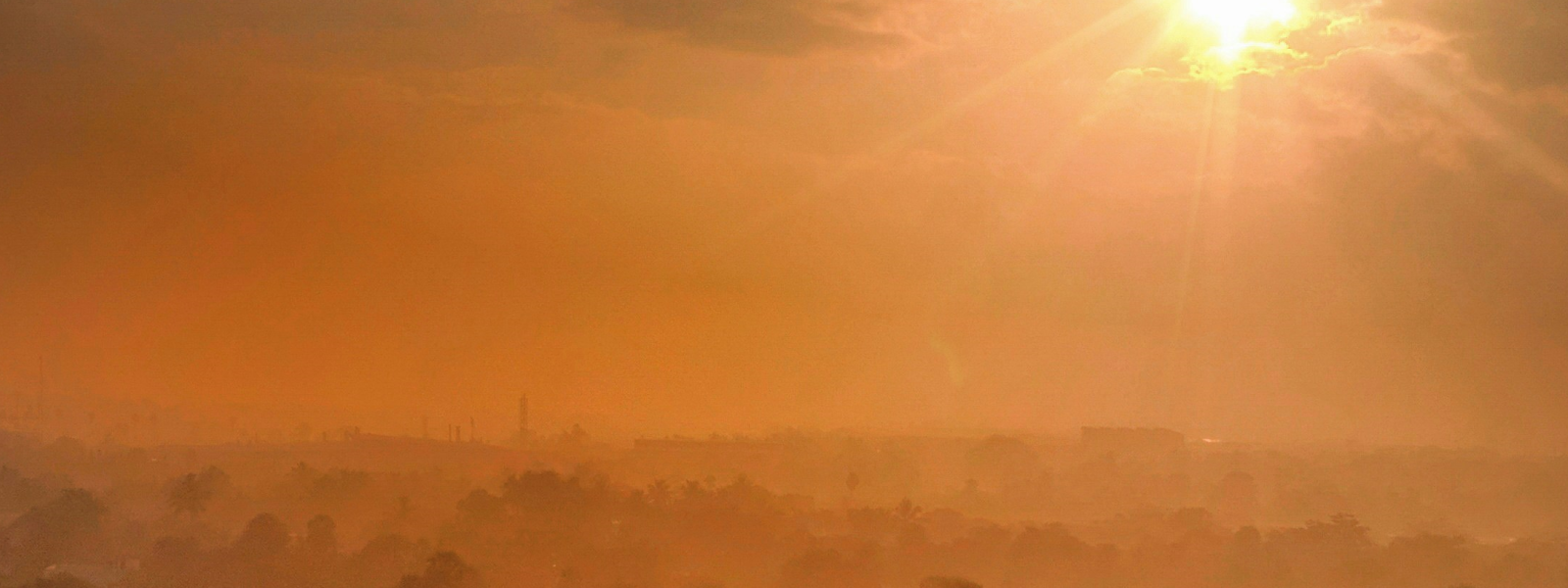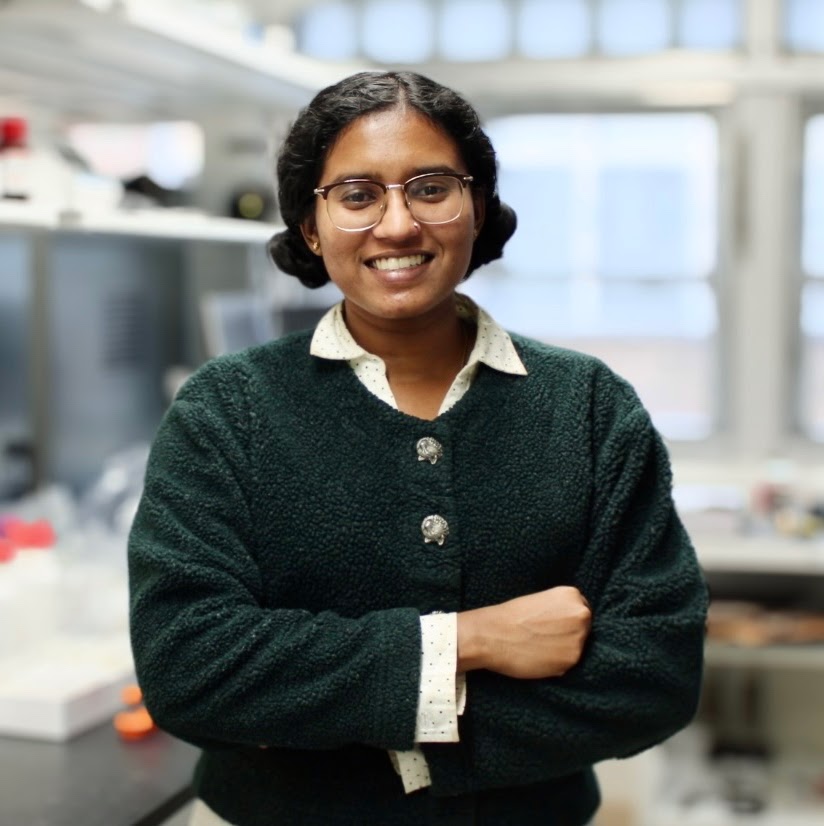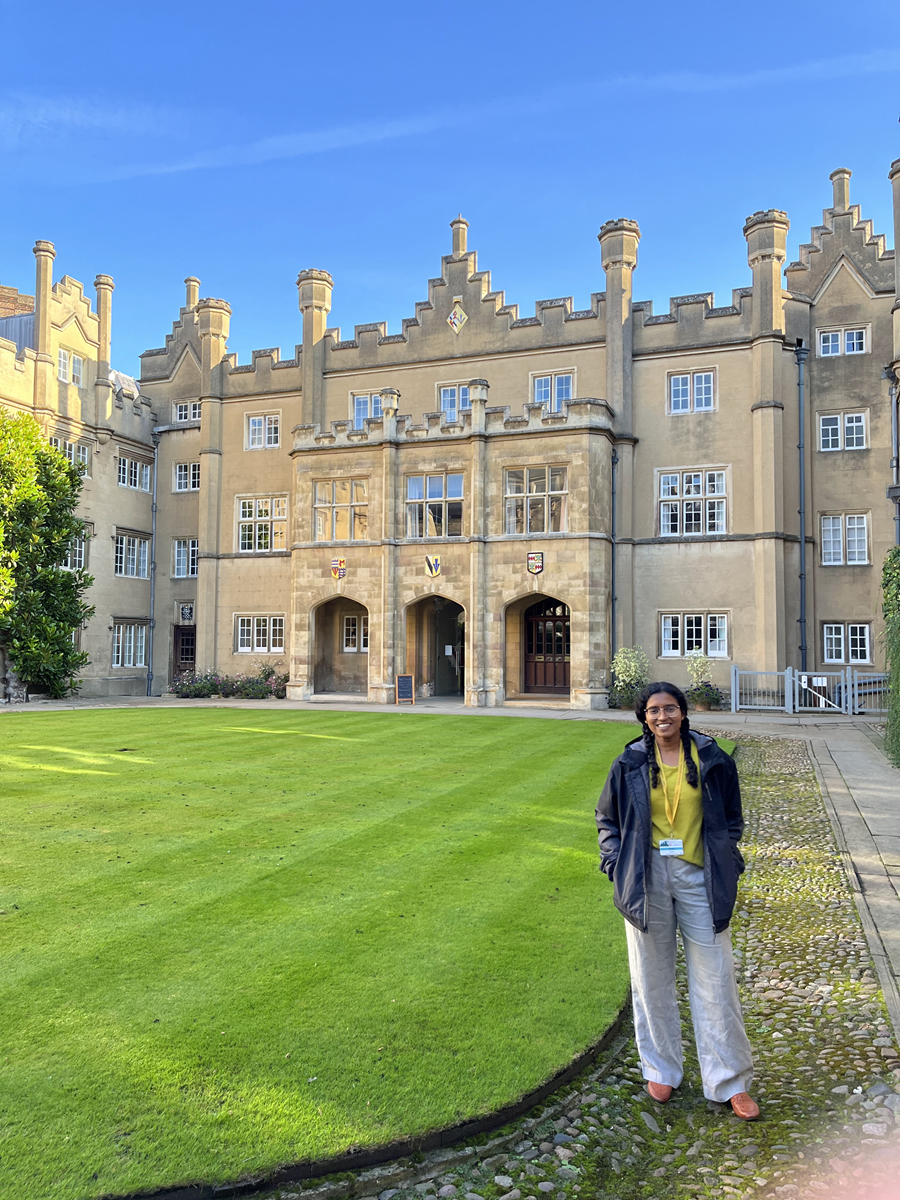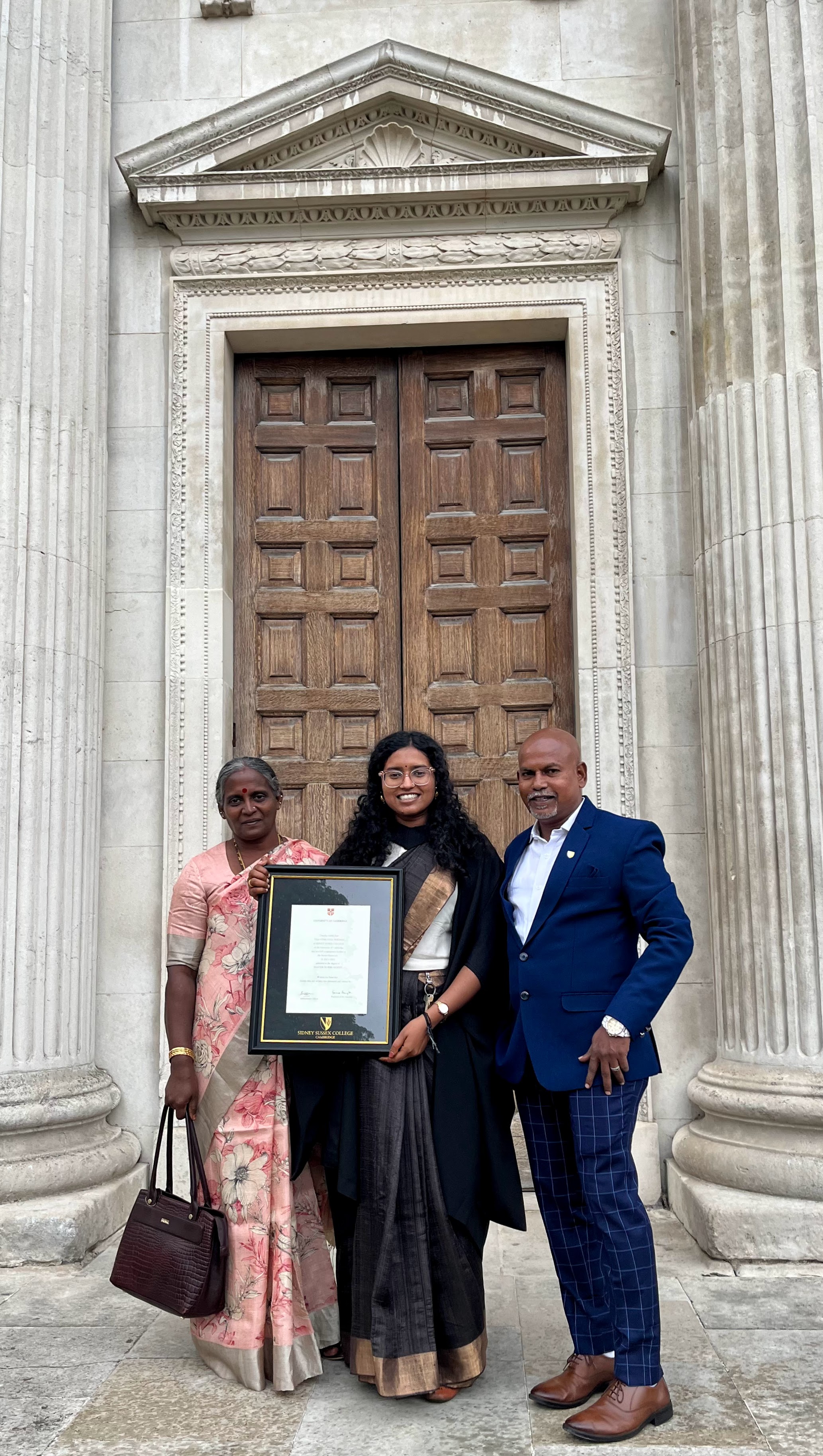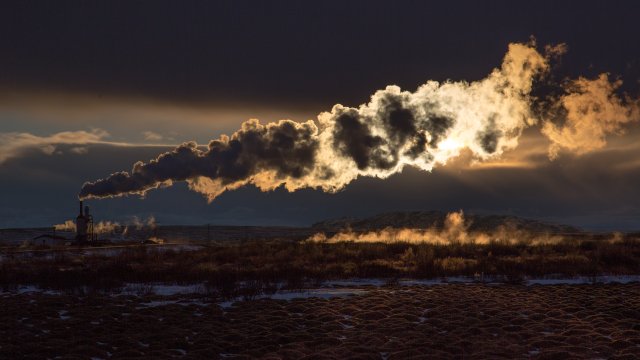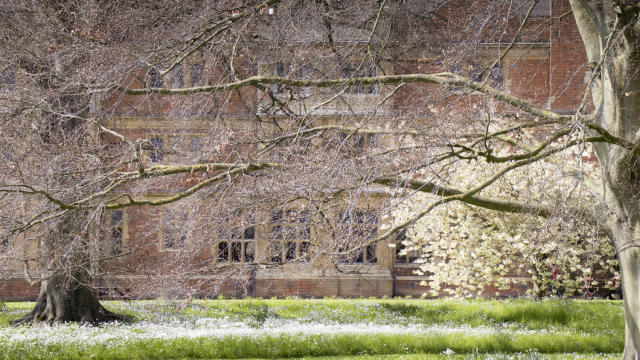There’s something quite ‘Hollywood’ about the story Teja Venkatesa-Perumal is telling me.
We are on Teams. Teja is in her graduate accommodation in Pasadena, California. I have to admit that her location might be playing a part, but her journey across continents, from her home in India, to world-leading labs at Cambridge and now Caltech, and her focus on research which might just help us tackle one of the great challenges of our time – climate change - feels almost too good to be true. That she’s still wearing her monogrammed Sidney jacket, in the California heat, is the kind of detail a scriptwriter would enjoy.
‘I grew up in the slums of Chennai. There were a lot of issues in terms of pollution and waste disposal. I didn't have to read books or watch movies to understand this is a big issue.
‘Growing up, our summers were becoming extremely hot. We had ten people living in what was supposed to be a house for a family of three – the ten of us shared two rooms. So, there was no avoiding the consequences of global warming. I didn't need someone to come and give a talk to be convinced this was an issue.’
And how did you respond?
“Early on, in elementary school, I used to go to a lot of art competitions, making posters for clean energy and environmental campaigns. Then I started volunteering for the Environmental Foundation of India.
‘It is evident that the effects of environmental and energy issues are compounded by poverty, by our social and economic situation. But addressing this is a very complex task. In India, it is still common to be in a family where both parents are daily wage workers - if they don't go to work on a particular day, they won't make any money. And the living conditions of many marginalised communities in India mean that they are the first to bear the brunt of climate change.’
Teja completed a B.Tech in Chemical Engineering at the National Institutes of Technology, Tiruchirappalli: ‘When it came to deciding what I wanted to do for my undergrad, my experience drove my decision. For me, Chemical Engineering was something I viewed as a tool.’ At the end of her first year, she took an internship in a lab. She admits she ‘still didn't really know what research entailed. I was like, “I'm going to do this research internship, I'll see what happens. If I don't like it, I’ll just focus on doing an MBA in the future.” That was my thought process.’
‘I started my internship and within 10 -15 days, not even halfway through it, I was like, “Oh my gosh, was I actually questioning this? I really loved it. I was working on clean energy and sustainable catalysis research. Once I started doing research in a lab, it was pretty evident that I could be a part of the solution.”
With no formal supervision, Teja’s independent nature served her well: ‘A lot of things were just stuff I had to figure out on my own. I would just call or email people. Luckily, a lot of graduate students had time to spare for me. I'm grateful for that.’
Having won scholarships to labs in Strasbourg and later Lausanne, Teja decided to apply to Cambridge, to further her research into developing sustainable catalysis for clean energy production, and specifically how to develop novel processes to convert carbon dioxide (CO2) into useful products.
‘So, at that point it was pretty clear to me that I wanted to do research. There were a couple of professors at Cambridge who were doing work that was super-related to me. I had known about them for a while, so I thought, “I'm just going to email them and then try to apply for the MPhil.”
‘The biggest thing, though, was that I was awarded a Commonwealth Scholarship. That was when I knew I could actually go.’
So what was your first impression of Cambridge and Sidney?
‘I didn't have much idea about what Cambridge would look like, but it was breath-taking. You're transported into this world and you go, ‘Wow!’. And, yes, I still tell people that if they're considering going to Cambridge for an MPhil or to do any research, go for sure, 100%.
‘Cambridge was a place where I got to experience a way of life, a way of life I don’t think you would get anywhere else.
'At Caltech, there is a similar “research life”, but the life that you get to lead as a student apart from the research you do is unique at Cambridge. It inspires the way you think about your research and how you go about your projects.
‘It was also a time of huge personal growth for me in terms of making new acquaintances and building friendships. Most of my really close friends were people I met at Cambridge, and we still visit each other. So, yes, it was a truly transformative year for me.’
Did you find the postgraduate community easy to navigate?
‘The Sidney MCR was really good. I felt like I had a very enriching student experience. I think Sidney did it really very well. I felt like I had a community. I knew everyone, it seemed like everyone knew me as well, and we would catch up all the time. We would go to MCR events together. I definitely felt very included.
‘I went to the Sidney May Ball with everyone in my house, and we had a lot of fun. We still talk about the May Ball and how much fun we had!’
During her year in Cambridge, Teja was President of the Cambridge Zero Postgraduate Academy, which aims to encourage interdisciplinary research to tackle climate change. She continued her own research, looking at creating new nanomaterials with improved stability, and developed tools to control their shape – and so their properties – during catalysis.
‘I was synthesizing bimetallic nanoparticles using a simple and cheap process. And these nanoparticles had the potential for interesting catalytic properties due to their shape, size and composition. Many times, nanoparticles undergo significant structural changes during the reaction. Then it becomes hard to pinpoint what property or structural aspect of the nanoparticle influences catalysis. I was developing methods to apply a uniform protective shell on these tiny nanoparticles to improve their stability and retain their shape. This was helpful in better understanding their catalytic properties.’
Having completed her MPhil, Teja began her PhD at CalTech, and took her place as one of the 100 scientists from India, Australia, Japan and the U.S. that form the first cohort of Quad Fellows.
‘At the moment I'm doing something pretty fundamental. I'm working on molecular catalysis and making metal complexes. I study how something like CO2 interacts with different metal complexes during a redox mediated catalytic process.
‘One of the biggest issues in CO2 reduction is that there's a competing, more-favoured hydrogen evolution reaction. We want to convert the CO2 to something useful, but what ends up happening is that the more kinetically-favoured hydrogen evolution reaction happens before the CO2 gets converted. By using a redox mediated process, I'm preventing the hydrogen protons and electrons from combining to just release hydrogen.
'Instead, I'm taking them and separately shuttling them to CO2, and then the catalyst can now act on the CO2 and see what happens.
‘The resulting process is what’s known as carbon conversion and utilization. We’re converting carbon dioxide into something more useful.
‘My focus is on understanding the fundamental aspects of this catalytic process. There’s a lot of research out there about CO2 reduction, but we still don't fully understand how the catalysis exactly happens. What does the catalytic cycle look like? To understand this chemical process in a very well-defined manner would really open a lot of opportunities to produce chemicals that are valuable for energy applications or in chemical industries in a more selective way.’
Coming from Chennai, you had that early understanding of environmental harm. You have experience of advocacy and, talking to you, I suspect you could have studied political science and been equally successful. As it happens, you also have this skillset in science. Is the advocacy element something you want to maintain? Or do you see yourself as very much a research scientist?
‘I do want to be in academia. I think it gives me a lot of opportunities to continue having a very high impact in terms of translating research from the lab to outside the lab. But at the same time, I do want to play a bridging role between academia and public institutions.
‘I definitely want to, at some point later, be in a position of public service. I think I have a lot to add through my scientific background. I also think a lot about social equity and how we can use policy tools to execute it.
'The Quad Fellowship has further opened my eyes to bridging STEM and research academia with government institutions, and how we can think and work hand in hand, or how we can help people who are in government to make more informed decisions.
‘It's eye-opening to meet policymakers because sometimes as a scientist, you feel that something is so obvious and think, “Why is no one doing this?”. And then when you talk to policymakers you realise there are other factors – they might say they can't push for something because there’s an economic or a social constraint.
‘There was a story recently – a village in India had been offered free solar panels. They could have had electricity, and their own electricity, but they said, ‘No’ – they wanted to be on the grid; to not be on the grid was a social taboo.
‘It’s when I hear stories like that that I feel really grateful for my life and upbringing, and how diverse it has been. And sometimes I feel I'm more grateful for that than my diverse research experiences. I think that my life experience has really given me a way of thinking – to put myself in someone else's shoes or to have a very broad view on things.’
We’re coming to the end of our conversation. Teja tells me she’s ‘really glad I went to Cambridge. I just catch myself being grateful for that decision.’ At the same time, California has its plus points: ‘It doesn't get cold here, really not at all.’
So, does it feel like a movie?
‘Sometimes it does feel like that. I find myself connecting dots, looking at the past and being, “Oh my gosh, I'm so grateful I made that decision back then”. In a way, I have always had to make all decisions by myself. My parents are not from an academic background. I was the first person in my family to go to university. I didn't really have mentors in my personal life who understood what I was doing.
‘I had to make my own group of mentors and I'm so grateful to the people who responded to my cold emails and messages.
‘Cambridge was a good example of that. I met a lot of mentors and made a lot of connections.
‘And now I'm really excited to see where this goes. I'm keen to see what role I can carve out for myself.’
Banner image: a skyline of Chennai by Thanuj Mathew, via Unsplash.com
If you have something that would make a good news or feature item, please email news@sid.cam.ac.uk
